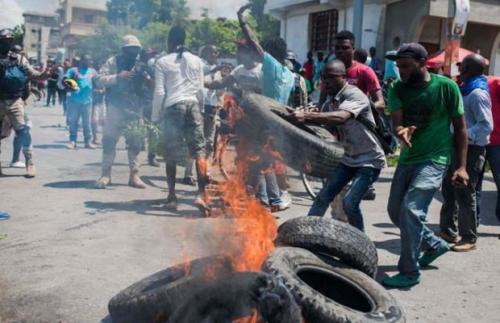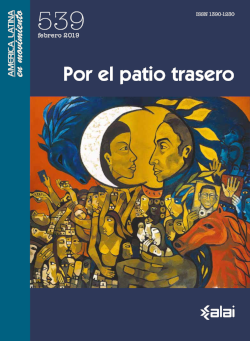The OAS and Democracy
In one political crisis after another, OAS leadership has followed Washington’s orders, turning a blind eye to U.S.-backed violations of its charter while using a heavy hand against nations that challenge U.S. government interests.
- Opinión

| Article published in ALAI’s magazine No. 539: Por el patio trasero 19/02/2019 |
The Organization of American States came into being in 1947-48, but has long roots in regional integration efforts since the late 19th century. Like other multilateral organizations, leaders supported the regional organization so it could act as a ballast to contain internal conflicts and as a unifying force to protect from foreign threats.
But the reality of U.S. power, hegemony and economic interests in the region have corroded the multilateral mission of the OAS from its origins. In one political crisis after another, the leadership has followed Washington’s orders, turning a blind eye to U.S.-backed violations of its charter while using a heavy hand against nations that challenge U.S. government interests. This has been especially true under the current leadership of the Uruguayan Luis Almagro. The attempt to install Juan Guaidó as president of Venezuela is the latest example, but the OAS’s biased pattern of supporting rightwing election fraud while operating U.S. regime change strategies against leftwing governments has left a bloody trail of social unrest, forced migration and authoritarianism throughout the continent.
A history of undermining democracy
When Juan Guaidó declared himself president of Venezuela in a sidewalk rally, the OAS Secretary General immediately congratulated him and sought to close off diplomatic channels for resolving the political crisis. Knowing he could not gain sufficient support in a General Assembly vote, Almagro announced his own support for Guaidó. He later obtained recognition from a sub-group of nations known as the Lima Group, with the important exception of Mexico.
This highly personal use of the position of Secretary General was protested by the Caricom nations, whose leader Timothy Hams wrote to express “disapproval and grave concern with regard to the position that you, in your capacity as Secretary General, have adopted, by recognising the president of the Venezuelan National Assembly, Juan Guaido as interim president of (Venezuela). This action on your part, without the authority of the member states of the organisation, is considered inappropriate”.[1]
Almagro, who took office in 2015, has been one of the most aggressive leaders of the OAS in representing U.S. interests, often violating the OAS charter in the process. But the perverse violation of the organization’s commitment to democracy in the name of democracy is not new.
In Haiti, the OAS has consistently manipulated and undermined elections at the bidding of the U.S. government. In 2010, it endorsed the imposition of Michel Martelly, providing a veneer for overt U.S. meddling in elections after the devastating earthquake on Jan 12. In 2015, the OAS certified a fraudulent and violence-ridden election. OAS complicity in U.S. designs to block Haitians from deciding the future of Haiti is a major factor in current protests against President Jovenel Moïse, which have led to violence and scarcity and a seemingly permanent situation of instability.
In Honduras, OAS actions vanquished any lingering hopes that it could play the role of an impartial arbiter. During the 2009 coup d’état, the organization originally protested the military ouster of the elected president, but then failed to restore constitutional order, despite broad consensus among member states. Since then, Honduras has lurched from one crisis to the next. The nation has suffered corruption scandals within the post-coup regimes, rule of law has deteriorated and state and criminal violence have soared, often combined.
In the November 2017 elections, President Juan Orlando Hernandez ran again despite the fact that the Honduran constitution explicitly prohibits re-election and apparently lost. The government shut down the vote count and came back with a reversal of tendencies that handed the victory to Hernandez. With the support of the U.S. Embassy, Hernandez took office amid widespread protests. The OAS waffled, first refusing to validate the elections, citing “irregularities, mistakes and systematic problems” in the electoral process. However, it eventually not only accepted Hernandez but moved to protect his government from accusations of corruption and abuse. The opposition accused the organization of supporting the US position to maintain him in power. The contrast between supporting election fraud in Honduras and ousting the elected government in Venezuela on the basis of electoral irregularities reveals once again the rightwing rather than pro-democracy bias of the OAS.
Government repression of post-electoral demonstrations has resulted in multiple assassinations of opposition demonstrators. Almagro has further contributed to the failure of democratic institutions in Honduras by obstructing anti-corruption investigations carried out by the OAS Mission to Support the Fight Against Corruption and Impunity in Honduras (MACCIH). Neutralized by infighting, lack of funding and Almagro’s supporting role to US policy, the MACCIH has been reduced to defusing rather than advancing popular demands against corruption.
The Honduran political crisis has forced thousands to flee and seek refuge in the United States, where many have family. The violence and mass exodus from the country are symptoms of this situation. As Honduran families face criminalization and even death on the migrant trail, experts agree that the only way to stem forced displacement is to address “the root causes of migration”. Almagro and the OAS have played a major role in creating them, while keeping silent on the human rights violations against migrants by the U.S. government.
OAS anti-democratic involvement in the internal affairs of American nations will not stop at Venezuela. Almagro and Trump’s regime change plans in the continent place Cuba next on the list. U.S. specialist in the violent overthrow of popular governments, Elliott Abrams, recently praised Almagro in a Council of Foreign Relations article that called “to end the revolution” in Cuba. Abrams is now Trump’s Special Envoy to Venezuela.
The alignment of the return of the bloodiest hawks in Washington, the rise of neofascism and an OAS that has lost all pretense of independence casts a dangerous shadow over the region. If democracy is to survive, nations will have to return to essential definitions, and reject the ideological “democracy promotion” programs that pervert rather than promote self-determination and people’s rule.
- Laura Carlsen, Mexican/US political scientist and journalist, is Director of the Americas Program in Mexico City.
Del mismo autor
- El sesgo político de la OEA y el futuro de la región 20/03/2020
- The OAS and Democracy 22/02/2019
- La OEA y la democracia 21/02/2019
- The Organization of American States Shouldn’t Be Run by Regime Change Zealots 30/01/2019
- Trump’s new trade order 09/11/2018
- The People Won, But Can They Take Power? 18/07/2018
- “Seguridad” que mata 14/06/2018
- A desarmar la violencia patriarcal 09/05/2018
- Disarming Patriarchal Violence 03/05/2018
- U.S Support for Honduras’ Fraudulent Election is a Betrayal of Democracy 08/02/2018









